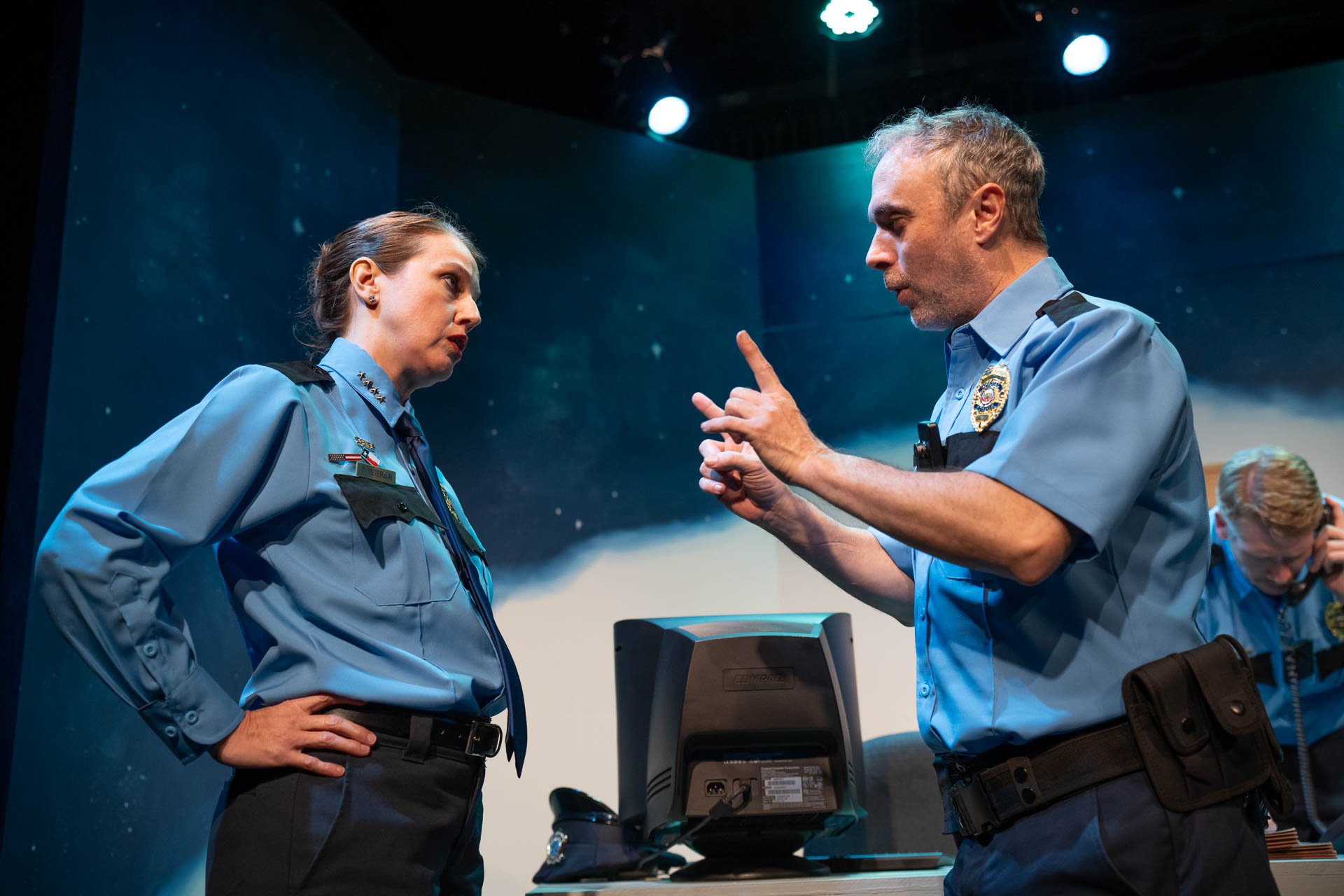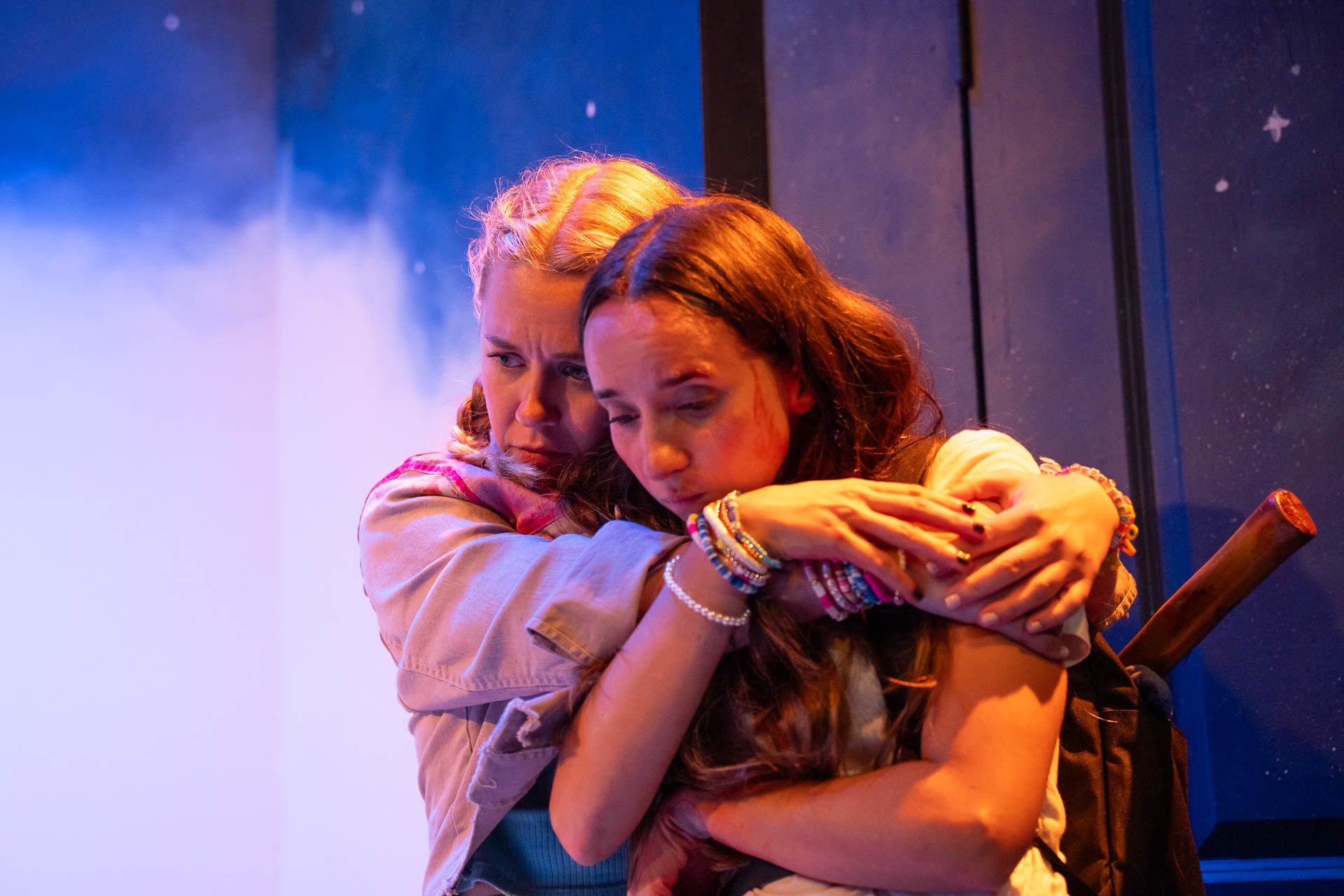Collapsing Stars And Cathartic Fires by Ilana Jael
Todd Bruno as Rick Montgomery and Casey Sacco as Kimmy in New City Players’ production of Little Montgomery
Something I didn’t know until Little Montgomery; the brightest a star will ever shine is in the moment just before its collapse. It’s something I learned when trying to decipher the unusual way Rick Montgomery describes the performance he had just seen from Kimmy, who dreams of becoming a star—in the sense of a “famous pop singer” like he is rather than the “celestial body” I refer to above.
“You’re a goddamn performer. You can light up a room as bright as a collapsing fucking star.” Rick says.
While he’s giving her a pretty big compliment, there’s also something darkly fitting about his particular choice of analogy. Though Rick was genuinely impressed by Kimmy’s guitar skills and sheer chutzpah, he has also just delivered the full scope of her dream a fatal blow by gently informing her that a childhood injury has probably ruined her chances at a singing career for good.
In the scheme of things, an inability to carry a tune is admittedly a pretty trivial impediment: but to Kimmy, a sensitive sixteen-year-old who had had her heart set on a certain path, the realization is genuinely devastating.
“I wasn’t supposed to just play the guitar,” she describes mournfully.
And she’s not the only character who comes head-to-head with their personal limitations over the course of Little Montgomery; there’s also Larry, whose storyline provides an example of a more adult “collapse” as he faces the potential loss of a career as a cop he has committed to as opposed to only considered.
Yet despite the fact that neither of these characters have found much of a “solution” to these respective dilemmas by play’s end, neither one can be found in outright despair. Because, as important as being a good singer might be to Kimmy and being a good policeman might be to Larry, both seem to place a higher priority on who they are in the eyes of their loved ones than in the eyes of the world.
And while we see this implied in the joy Kimmy takes in finally being reunited with her “soul friend” Megan after the two are separated, we see a more direct shift between two suddenly-opposing identities play out in Larry’s case. When he has to choose between adhering to protocol or acting to protect his daughter, he reflexively chooses the latter—a decision for which he then refuses to apologize when confronted about it a scene or so later.
“I’ve never been good at… things,” he describes.
“But I am pretty damn great at being a father.” he proclaims with pride.
Elizabeth Price as Patty and Seth Trucks as Larry in New City Players’ production of Little Montgomery
Especially following painful scenes in which Larry’s chief confronts him about his shortcomings and in which he then berates himself, this moment is one that feels like a genuinely triumphant reclamation of self-worth. Moreover, he’s not the only one in the play that recognizes the strength of his love for his daughter as the profound gift it is.
“He would do anything for her! And that’s just—that’s not like a given, you know?” his friend Chet describes.
“It’s so bright and magical, it’s like staring directly into the sun!”
Enhancing these themes in Little Montgomery is a story that unfolds in parallel about Larry’s adopted daughter Megan and her biological father Rick. Though they get off to a rocky start, the two’s innate synergy eventually allows for a tentative connection. After they begin to bond, Rick even demonstrates a newfound paternal protectiveness of his own by taking his daughter out of a “dangerous” confrontation in which weapons are raised and at least one shot fired.
However, the two don’t get very far before they hit another proverbial bump in the road, as Rick belatedly realizes he didn’t dodge said bullet but is urgently bleeding out. And since Rick insists that a trip to the hospital would be more trouble than it's worth, Megan ends up having to resort to a rather primitive method to save his life; cauterization.
Krystal Millie Valdes as Megan in New City Players’ production of Little Montgomery
Given that the procedure entails violently sealing a wound by burning the affected flesh, it takes a bit of convincing—and of vodka offered as an impromptu anesthetic—before Rick yields to Megan’s lighter. But the idea of fire as a force that can be as healing as it is harmful seems to have been hinted at metaphorically in one of his own earlier references, in which he describes his late wife Mary as having been “the kind of fire you need to survive the winter.” He then warns Megan and Kimmy against becoming dependent on such fires, which are bound to leave only heartbreak when they go out.
Yet the play also presents evidence that the fire of his wife’s life force hasn’t entirely vanished. For one, there’s the part of Mary that lives on in Megan, who clearly displays signs of having inherited her mother’s red-hot spirit. And, to come back to a moment I referenced in one of my prior posts, that spirit has also been captured in a recording of one of Mary’s last works that Rick shares with Megan, which hints at her regret that the three were unable to remain a traditional family.
Especially in the stellar performances of New City Player’s cast, we can see how precious and yet painful it is for the characters to reckon with this remnant, given the fact not only of Mary’s loss but of the potentially happier life the characters could have shared. But as Mary reminds us in the song itself, there is no way of changing history, just as, to go back to Kimmy’s predicament, there is no way of un-scarring a damaged vocal fold.
Too, in the end, few of us are likely to get through life without ending up a little bit broken; and, not every wound we accumulate will be one that can be fully healed. None of us have the foresight to avoid ever being mistaken; and not every wrong turn will necessarily allow for a later doubling back.
In that way, all of us likely have something in common with another thing that happens to have been left behind by Mary; her 1927 Martin 45 guitar. According to Rick, it’s been busted, broken, chipped, restrung, and then broken again—even, at one point, burnt. Accordingly, it has now lost much of its market value; but, at least for Megan, its sentimental value is higher than ever because of all these bumps along the way.
One could imagine there’s even a bit of truth to the way Mary describes the reason she never fully fixed the instrument in an interview with Country Weekly, despite the fact that Rick alleges she was just BSing when Kimmy brings it up. Said reason being: she’d become accustomed to the “just right” way that it plays not despite but because of the imperfections of its chords.
Krystal Millie Valdes as Megan in New City Players’ production of Little Montgomery
And maybe it’s only in hindsight that we’ll be able to tell which of the fires we walk through will strengthen us and which will simply sear us; whether the feeling of any given flame is something that will only burn or somehow cauterize, preventing the further spill of blood. After all, when I turn my eye towards my past, I can identify not one but a plethora of points that seem like “collapse” points, each representing a major shift of expectations about how my life would unfold. Yet when I gaze back at it all given a galaxy or so of distance, it seems in some sense that the “death” of each dream was not only necessary but fortuitous, a luminous explosion that would light the way for something new.
Take, for instance, something like the pandemic, though this was less of a personal collapse than a societal one. Before that point, I had considered myself at least potentially “done” with theatre as a serious area of focus. But when the world stopped, I suddenly found myself exploring the local performing arts scene via Zoom events and getting back into playwriting, largely because there was nothing else to do.
It’s impossible to tell when and if this shift would have transpired had the pandemic not happened, or whether I would have ended up associated with NCP at all if not for my consistent engagement in their COVID-era virtual programming. And it seems too that the entire company’s path would have been completely different if not for all that transpired in direct response to this twist of fate, including the decision to adapt Little Montgomery into a podcast that led directly to the eventual full production.
To again steal a bit of the language from my once-upon-a-time review, I could recognize even from afar the importance of what the project—and the decision to unveil it in-person, albeit with strict precautions in place—represented against the stark backdrop of the times. The importance of this reminder that something remained of our ability to connect to others in person; that whatever spirit drives us to keep creating was still a fire that burned within us, trapped as it was beneath our masks.
Along with something that’s been attested to in much formal research since, the unique emotional value of the theatrical experience is something that has been recognized since the art form’s earliest days. All the way back in the BCs, Aristotle described in his foundational Poetics something that he called catharsis, which he defined as a phenomenon in which identifying with the negative emotions experienced by a character in a play could effectively purge audience members of those emotions in themselves. As something that at once burns and cleanses, perhaps this experience is even one that could be considered akin to cauterization, a painful ritual needed to make way for renewal
But before I bury myself entirely beneath this morass of mixed metaphors, I’d like to reflect on the way in which not only Little Montgomery’s Larry but characters seen throughout NCP’s season ultimately chose to honor their strongest connections with others even when asked, ordered, or enticed to act otherwise. When given the chance to escape an oppressive regime, Edwin of Cry Old Kingdom instead chose to stay behind to ensure his wife’s survival; and we see It’s A Wonderful Life’s George Bailey make not one but countless sacrifices to serve his family and community rather than pursue his individual dreams.
Casey Sacco as Kimmy and Krystal Millie Valdes as Megan in New City Players’ production of Little Montgomery
And so, next time you find yourself face to face with one of these dilemmas, I might encourage you to entertain the thought of how you might survive the winter that’s bound to follow every spring of splendor or of glory. As tempting as it can be to prioritize the rat race over our relationships or to seek respite from the responsibilities they entail, the pleasures of escapism and achievement tend to be altogether more fleeting than the sense of security and satisfaction that can be found in our deepest bonds.
Whether these be relationships within a typical family or friendships within a found one, we assure ourselves in investing in them a source of worth that is likely more dependable than one based on shorter-lived freedom or success. In leaning close to those we love, we will often find not only much-needed warmth but the spark that reignites our spirits when we find ourselves short of fuel.
Like a glimmering North Star, this idea has echoed its way through all three of our 2022-2023 productions, making this a perfect note on which to end another year of reflection on New City Players’ efforts to connect with, enlighten, and amuse our audiences as we seek to fulfill our vision. Meanwhile, before we go dark for a few months, it isn’t too early to start getting hyped up for our next season of incredible theatre!
As you may or may not be yet aware, this all-star line-up will begin with a brand new adaptation of a beloved holiday story in a radio play version of A Christmas Carol written by our own Tyler Johnson Grimes. Next up is our first ever world premiere of 1000 Miles by local Latina playwright Vanessa Garcia, which will be followed by a Pulitzer Prize winning play that has been recognized as one of the best of all time in Tennessee Williams’ A Streetcar Named Desire. Since I don’t think you’ll want to miss any of these very special shows, it isn’t too early for anyone with the urge to go ahead and subscribe, and I can’t wait to see you all back at the theatre!






